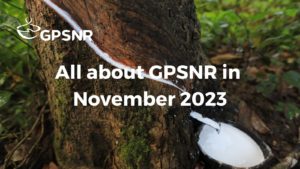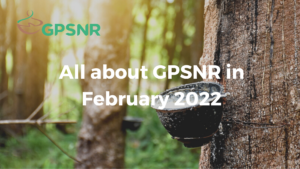In our last issue, we explored the road ahead for GPSNR’s Working Groups following the outcome of the second General Assembly. In this update, we check in on each Working Group to see where they are in their respective journeys.
Strategy and Objectives Working Group
The Strategy and Objectives Working Group has already started working on a proposal for increased Working Group alignment within the Platform. The Working Group is also finalizing the Request for Proposal (RFP) for a study on environmental impacts, and risks, in the natural rubber value chain. With its intended focus on biodiversity and ecosystem services, this study will complement the previously commissioned social risks study (conducted by independent consultants James Griffiths & Associates Sàrl).
The Living Income Gap studies for Indonesia and Thailand, initiated by the Equity sub-Group, are expected to be delivered to the sub-Group in November.
‘Policy Toolbox’ Working Group
The Policy Toolbox Working Group has drafted revised Terms of Reference (ToR) that will cater to the work they now have to develop following the approval of the Policy Components at the General Assembly on 23 September 2020. The next phase of work will see the Policy Toolbox Working Group developing implementation guidance for each stakeholder group, as well as future reporting requirements that will build on the baseline reporting requirements and align with the policy implementation guidance. The revised ToR will be discussed further at the Executive Committee level before being approved.
The Policy Components were approved as part of a resolution for the endorsement of a GPSNR policy framework for natural rubber production and sourcing for ordinary member companies. A booklet containing the Policy Components can be found here.
‘Capacity Building’ Working Group
The Working Group’s latest discussion was centered around its restructuring, and touched on considerations for a revised ToR to accommodate the shift in focus from developing strategies to operationalizing them. The Working Group has also kickstarted discussions around the initiation process for one of the capacity building strategies, namely the identification and gathering of Good Agricultural Practices.
‘Traceability and Transparency’ Working Group
The Working Group will soon be reviewing Traceability and Transparency Tools Comparison study to develop next steps as well as recommendations to the Executive Committee.
Download the October 2020 Working Groups Update Slide Deck for more details on the progress of each Working Group.






